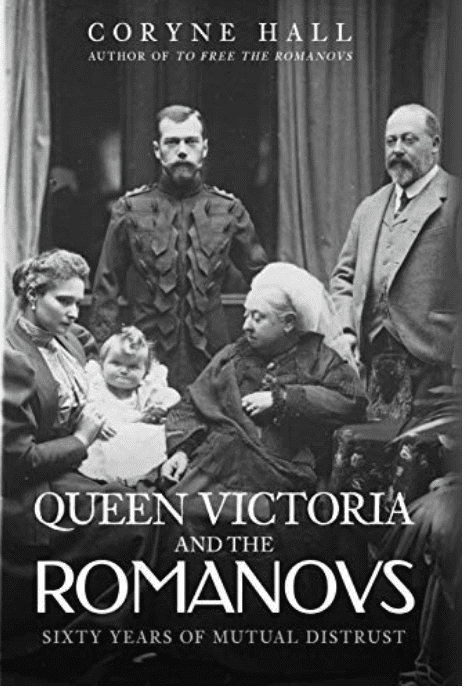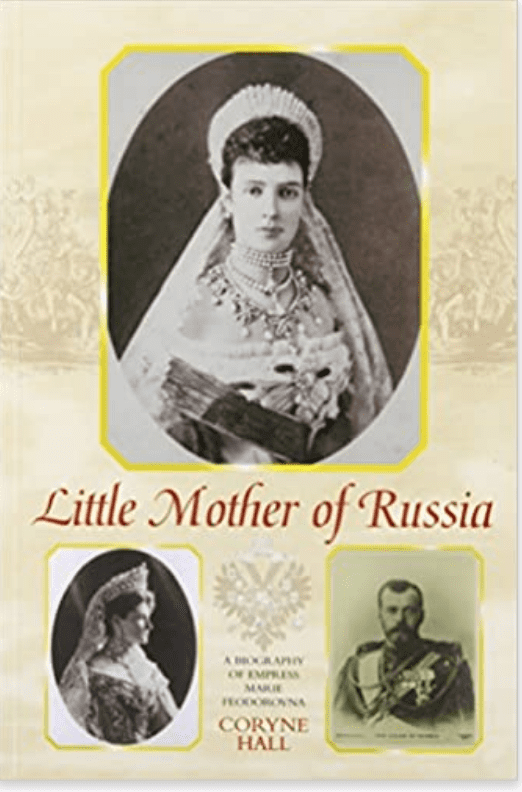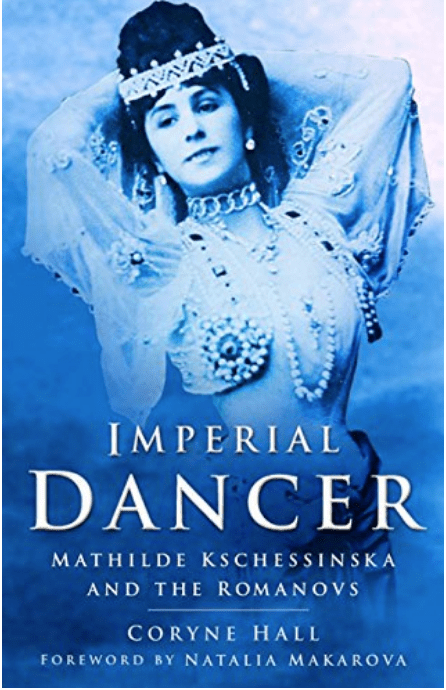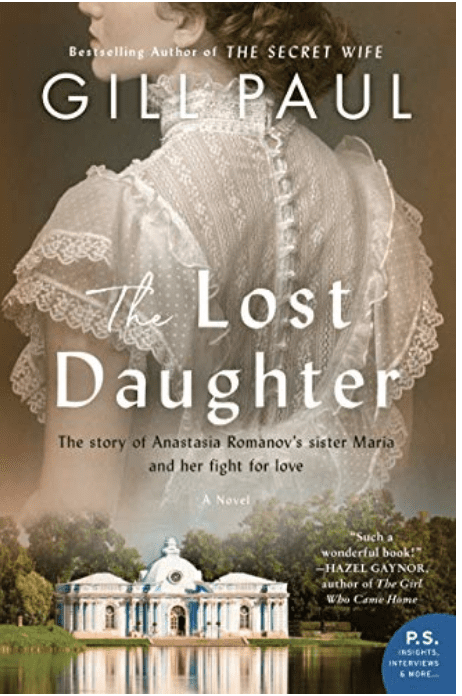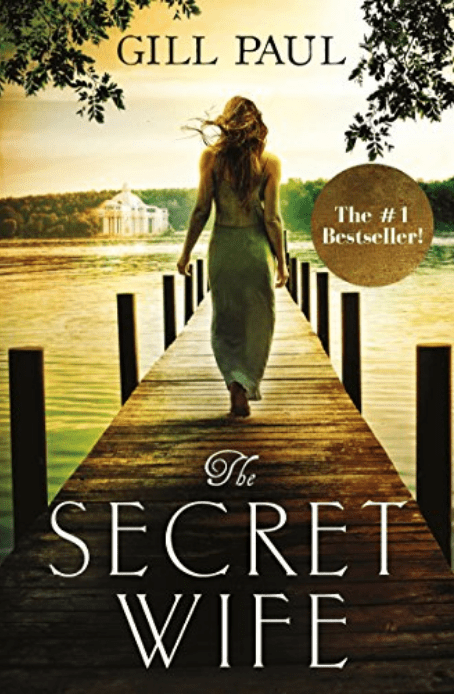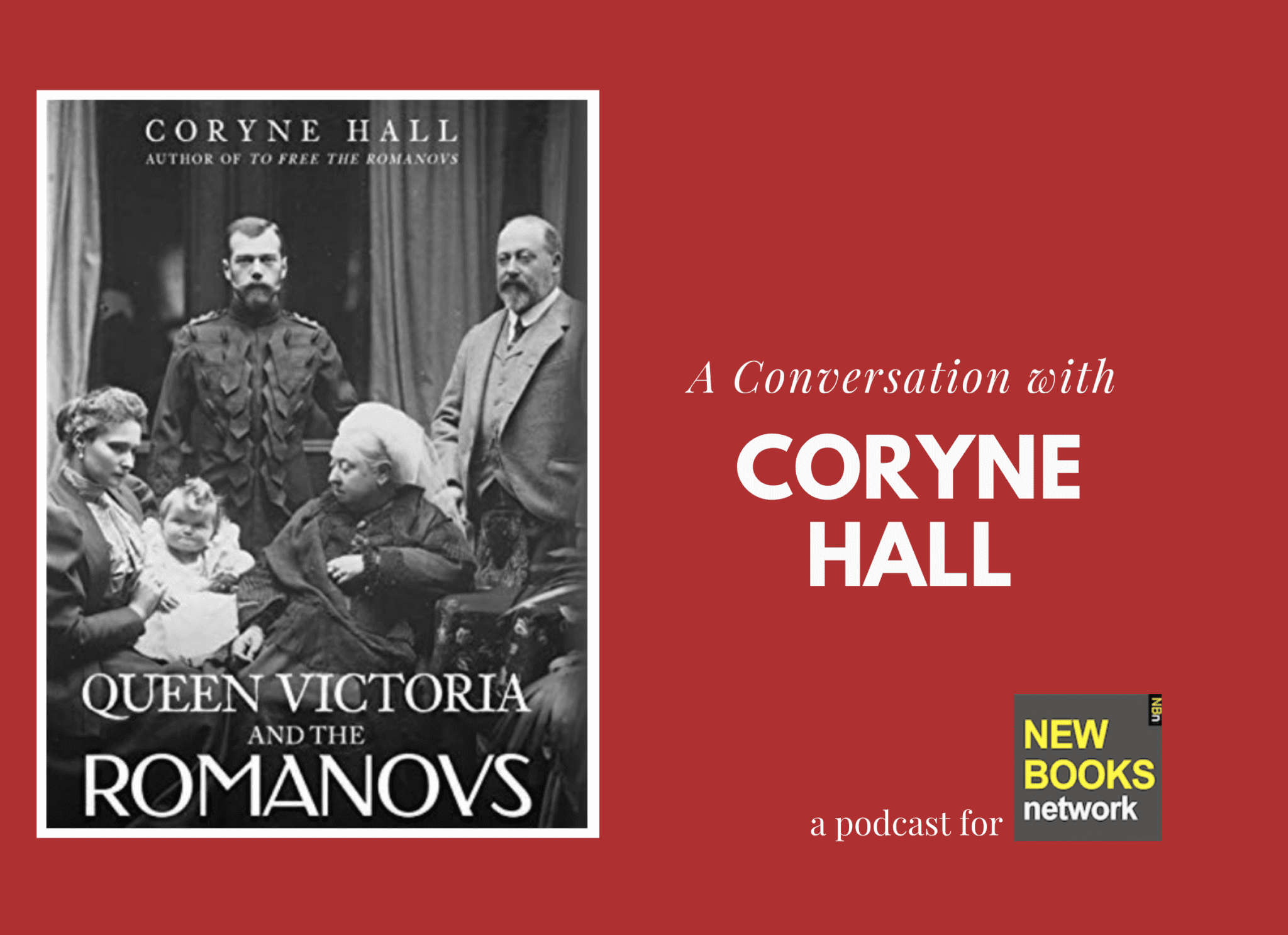
Queen Victoria and the Romanovs: 60 Years of Mutual Distrust
by Coryne Hall
Amberley Publishing
(2020)
A podcast for The New Books Network
Queen Victoria’s sixty-year relationship with the Romanovs
The balance of power in nineteenth-century Europe was anchored on one end by the redoubtable Queen Victoria (1819 -1901), the doyenne of sovereigns, and at the opposite end by the autocratic Romanov dynasty — four successive emperors who ruled Russia during Victoria’s own 63-year reign. Between these great powers lay the rising military power of Prussia, which concerned both Britain and Russia, and a decaying Ottoman Empire from which both hoped to benefit, as well as shipping routes vital to both countries’ commercial and military interests. These and numerous other concerns made the relationship tense at the best of times. But Victoria’s large family was also entangled with the Romanovs through the complicated web of royal and dynastic marriages that linked the ruling houses of Europe.
These political and personal ties are the subject of royal biographer, Coryne Hall’s new book, “Queen Victoria and the Romanovs: 60 Years of Mutual Distrust.”
The Family of Queen Victoria by Franz Winterhalter
Ms. Hall is a seasoned royal biographer and chronicler, who has delighted royal buffs with her authoritative biographies of Empress Marie Fyodorovna, Grand Duchess Xenia Alexandrovna, Mathilde Kschessinska, and her exploration of royal Princesses who served as wartime nurses as well as the Imperial estates in the Crimea. In “Queen Victoria and the Romanovs,” Ms. Hall delves into the extensive trove of Queen Victoria’s diaries and personal correspondence to construct an ambitious and highly informative portrait of her six-decade relationship with the Romanovs, which is at times cordial and diplomatic and at other times overtly hostile.
The first encounter takes place “off stage” as far as Victoria is concerned, but very much sets the stage for the tension to come. Victoria’s aunt, Juliane of Saxe-Coburg Saalfeld’s miserable marriage to Russia’s Grand Duke Constantine ended — most extraordinarily for the time — in divorce. The Coburg family felt that Juliane had been very badly treated by the Romanovs, a sentiment that was inherited by the next generation of Coburgs, which included Victoria and her cousin and future husband, Prince Albert of Saxe-Coburg.
Before Albert linked his name in perpetuity with that of Victoria, however, the 20-year-old Queen was swept off her feet — quite literally— by the dashing Grand Duke Alexander, son and heir of Tsar Nicholas I. On a visit to London in 1839, the Grand Duke made quite an impression on the young Queen; all thoughts of poor Aunt Julie and the prudent warnings of Lord Melbourne and Victoria’s Coburg Uncle Leopold, King of the Belgians, were forgotten as Victoria indulged in champagne and her first “crush” on the future Tsar Alexander II.
Nicholas I and his four sons
Dynastic Alliances
Efforts to mend fences only succeeded in creating more tension as Alexander II’s only daughter, Marie, and Victoria’s second son, Alfred, married in 1874. Imperious and stubborn, Grand Duchess Marie was one of the few in Victoria’s immediate orbit who dared to contradict the queen or challenge her authority. Marie and Alfred’s marriage was not a success, though they had five children, and ruled the Duchy of Coburg. This fact and the growing danger from terrorists in Russia made Victoria steer away from any further alliances between her own family and the Romanovs. It was as a wary grandmother that the Queen’s fears were realized when her Hessian granddaughters, Princesses Elizabeth and Alix married Grand Duke Serge and his nephew, the future Tsar Nicholas II.
Coryne Hall points out that Victoria was fonder of Nicholas II than she was of almost any of his relations, but this did not deter either from championing the best interests of their respective empires. Russia’s centuries-old desire to return Constantinople to its Orthodox orbit and Britain’s determination to rule the world’s waves would bring Russia and Britain into conflict numerous times as the nineteenth century drew to its close. Though Victoria’s death in 1901 ensured that she would not witness the carnage to come in subsequent decades, the lasting legacy of hemophilia, which Victoria bequeathed to several of her royal daughters and granddaughters, had a profound effect on the fate of Nicholas’s empire and that of the Queen’s Romanov great-grandchildren.
“Queen Victoria and the Romanovs: 60 Years of Mutual Distrust” is a fascinating journey through the intimacy of royal politics and diplomacy, and a study in the universality of family squabbles, even in the most exalted of families. With her signature fusion of impeccable research and eminently readable prose, Coryne Hall has once again delivered an informative and entertaining royal read.
Nicholas, Alexandra, Elizabeth, and Serge at the Marriage of Grand Duke Ernst of Hesse and Princess Victoria Melita of Edinburgh
Enjoy my conversation with Coryne Hall
Coryne Hall is the author of 12 books, including “A Biography of the Empress Marie Feodorovna 1847-1928,” “Imperial Dancer. Mathilde Kschessinska and the Romanovs,” and “Imperial Crimea: Estates, Enchantment & the Last of the Romanovs.” Follow Coryne Hall on Twitter.
Grand Duchess Marie Alexandrovna and members of her family at the Coronation of Nicholas II
Read more about The Romanovs
I've curated the best biographies, autobiographies, studies, and photograph albums of the Romanovs, with a heavy lean on Nicholas and Alexandra and their family. You'll find all memoirs of the Imperial Family and their retinue here, as well as a complete list of photograph albums and coffee table books. This is updated two or three times a year to reflect new releases.
Learn MoreThank you for stopping by!
Let’s stay connected!
Thank you for stopping by for this podcast! If you’d like to learn more about The New Books Network, visit their website and subscribe to any of the 87 channels, covering almost every academic discipline. I contribute to the Food, Russia & Eurasia Studies, European Studies, Eastern European Studies, and Historical Fiction channels.
Below, you’ll find more information on the kind of subjects I write about — it’s an eclectic list! I’ve also included links to previous posts about travel, cuisine, history, and lifestyle topics. I hope you’ll enjoy browsing around.
This post does contain affiliate links. Any purchases you choose to make via these links will net me a small commission from the retailer. I use these funds to support the maintenance and development of this website.
I hope you’ll consider staying connected with me by subscribing to receive regular updates or joining the conversation on Facebook, Twitter, Instagram, and Pinterest!
This post does contain affiliate links. Any purchases you choose to make via these links will net me a small commission from the retailer. I use these funds to support the maintenance and development of this website.
I hope you’ll consider staying connected with me by subscribing to receive regular updates or joining the conversation on Facebook, Twitter, Instagram, and Pinterest!
Images in this post are sourced from Wikimedia Commons.
Food
Exploring food markets, developing recipes, and just eating was once my hobby, but now it is a full-time job. I write about food markets around the world, develop recipes, and study culinary history and emerging trends. I have a particular interest in Russian and Eastern European cuisine and culinary history.
Lifestyle
I believe that great books are part of a life well lived and this extends to audio entertainment. Under the Lifestyle umbrella, I review books, podcasts, and audiobooks, I discuss writing and reading and am constantly on the lookout for new ways to be productive and clear all manner of clutter from my life.
Enjoy more discussions and reviews like this one
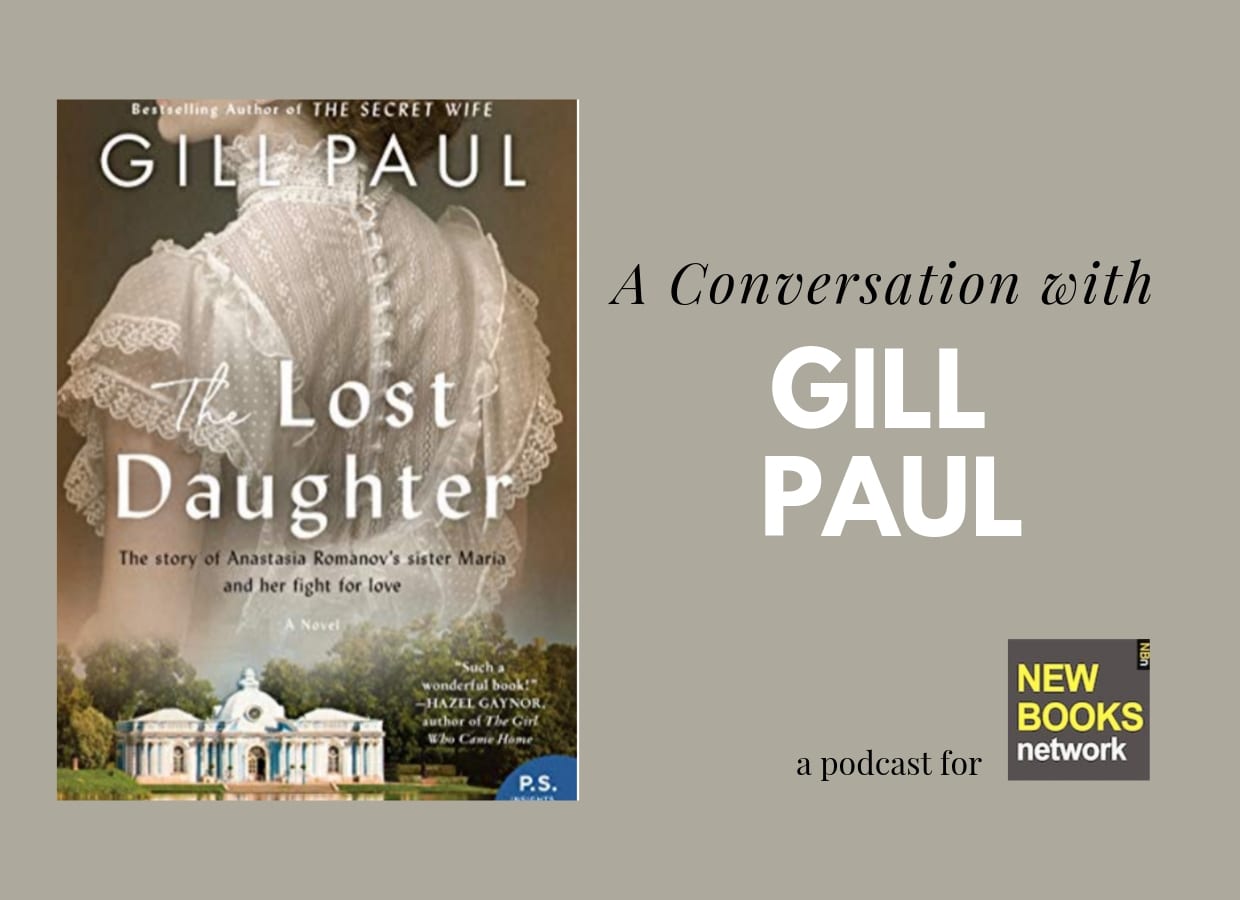
The Lost Daughter
by Gill Paul
Harper Collins
(2019)
A podcast for The New Books Network
A Lost Grand Duchess and a Life Reclaimed
Grand Duchess Maria Romanova arrives in Ekaterinburg in 1918 with her parents, the former Tsar Nicholas II and his wife, Alexandra. After months of house arrest in the deep interior of Russia, the family is beginning to despair of ever being rescued. As conditions worsen, Maria and her family are increasingly at the mercy of the men set to guard them. As the pro-monarchist White Army approaches Ekaterinburg, the fate of the Romanovs hangs in the balance.
Thousands of miles away and six decades later, Australian Val Doyle has her hands full with an abusive husband, a small daughter, and a mystery surrounding her recently deceased father, who died claiming, “I didn’t want to kill her!” The only clues to what may have happened are a vintage camera with a roll of film still in it and an exquisite jeweled box that refuses to open.
Veteran novelist Gill Paul unravels the stories of Maria and Val in The Lost Daughter (Harper Collins, 2019), a meticulously researched, engrossing novel set in Russia, China, and Australia, which follows her highly popular 2016, The Secret Wife, in which she imagined an alternative history for Maria’s elder sister, Grand Duchess Tatiana. As Val finds the courage to defend herself against her husband, so too, does Maria mature into a strong, self-sufficient woman, though in a vastly different setting than the one imagined for a Romanov Grand Duchess.
The Lost Daughter is a thoroughly satisfying read: Romanov fans will rejoice at this latest iteration of the alternative narrative; one which elevates the genre considerably. Gill Paul’s deft plot twists as Val tries to solve her father’s mystery are rewarding and perfectly crafted, as is the marvelous detail Paul brings to the sweep of twentieth-century history.
Gill Paul’s best-selling historical novels have been translated into twenty languages. They are set in recent history and feature real historical characters presented innovatively. Gill is a native of Scotland, but today makes her home in London. She is a popular speaker on subjects such as the British Royal Family, the Romanovs, and writing. Follow Gill on Twitter, Facebook, Instagram, or visit her website.
Enjoy my conversation with Gill Paul.
Recommended Related Reading
Some of the many books Gill mentioned in our discussion, which she found excellent source material for The Lost Daughter.
Helen Azar’s highly anticipated translation of Grand Duchess Maria’s diaries follows her equally engrossing translations of Tatiana Romanov, Daughter of the Last Tsar: Diaries and Letters, 1913–1918 and The Diary of Olga Romanov: Royal Witness to the Russian Revolution.
Read more about The Romanovs
I've curated the best biographies, autobiographies, studies, and photograph albums of the Romanovs, with a heavy lean on Nicholas and Alexandra and their family. You'll find all memoirs of the Imperial Family and their retinue here, as well as a complete list of photograph albums and coffee table books. This is updated two or three times a year to reflect new releases.
Learn MoreThank you for stopping by!
Let’s stay connected!
Thank you for stopping by for this podcast! If you’d like to learn more about The New Books Network, visit their website and subscribe to any of the 87 channels, covering almost every academic discipline. I contribute to the Food, Russia & Eurasia Studies, European Studies, Eastern European Studies, and Historical Fiction channels.
Below, you’ll find more information on the kind of subjects I write about — it’s an eclectic list! I’ve also included links to previous posts about travel, cuisine, history, and lifestyle topics. I hope you’ll enjoy browsing around.
This post does contain affiliate links. Any purchases you choose to make via these links will net me a small commission from the retailer. I use these funds to support the maintenance and development of this website.
I hope you’ll consider staying connected with me by subscribing to receive regular updates or joining the conversation on Facebook, Twitter, Instagram, and Pinterest!
Food
Exploring food markets, developing recipes, and just eating was once my hobby, but now it is a full-time job. I write about food markets around the world, develop recipes, and study culinary history and emerging trends. I have a particular interest in Russian and Eastern European cuisine and culinary history.
Lifestyle
I believe that great books are part of a life well lived and this extends to audio entertainment. Under the Lifestyle umbrella, I review books, podcasts, and audiobooks, I discuss writing and reading and am constantly on the lookout for new ways to be productive and clear all manner of clutter from my life.

